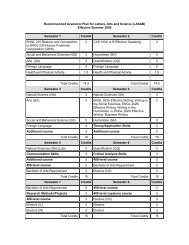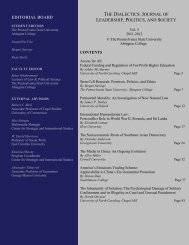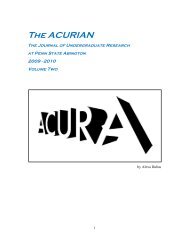Vol. III - Penn State Abington
Vol. III - Penn State Abington
Vol. III - Penn State Abington
You also want an ePaper? Increase the reach of your titles
YUMPU automatically turns print PDFs into web optimized ePapers that Google loves.
the astounding prevalence of HIV/AIDS among the children abducted by the LRA. Among the<br />
83 children tested at the center, 43 of those were found positive (Weber, Becker & Rone 2003).<br />
Sadly, the former abductees deal not only with the physical and mental abuse that they suffered,<br />
not only with the scars left on their bodies by being physically assaulted, but also with diseases<br />
that are often either too expensive to treat, or simply incurable.<br />
Simply put, the trauma suffered by the LRA’s abductees does not stay in the LRA camps;<br />
it follows the victims home and for the rest of their lives. Many Ugandans, be it because of Post<br />
Traumatic Stress Disorder or blunt force trauma to the head suffer from mental illnesses.<br />
According to an Integrated Regional Information Networks report gathered for the United<br />
Nations in October 2008, an estimated 48% of the Internally Displaced Persons (IDPs) in the<br />
districts of Gulu, Kitgum, and Amuru suffer from PTSD, 24.8% have exhibited suicidal<br />
tendencies, and 24% suffer from depression (2008). Recovering from the havoc that the LRA has<br />
created clearly demands some rehabilitation for those suffering from emotional trauma.<br />
Integration into society also poses a significant obstacle. While some abductees are lucky<br />
enough to escape the LRA, they often find themselves uncomfortable—and, in some cases,<br />
resistant to—returning home. Women who served as wives in the LRA, for example, are often<br />
not taken back by their husbands. An employee for Caritas, an organization that deals with<br />
poverty throughout the world, describes the difficulties faced by former LRA wives, “They know<br />
they are a burden for their relatives, they will not be able to go to school if they return with<br />
children, and they don’t see any future for themselves here” (Weber, Becker & Rone, 2003).<br />
Additionally, children often hesitate to return home because they fear a re-abduction. In fact,<br />
about 61% of escaped children who were held by the LRA for more than two years reported<br />
fearing for their lives.<br />
As an increasing amount of attention has been brought to the crisis in Uganda, the Lord’s<br />
Resistance Army’s presence appears to have diminished since 2005. In 2001, the United <strong>State</strong>s<br />
declared the LRA as a terrorist organization, and, in 2005, the International Criminal Court<br />
issued 33 arrest warrants against Joseph Kony and some of his top officials for war crimes and<br />
crimes against humanity. As a response to these arrest warrants, Kony and his top officials<br />
immediately retreated out of Uganda and into both Sudan and the Democratic Republic of<br />
Congo. Though the violence in Uganda has thus decreased dramatically, the number of attacks in<br />
Sudan and the Democratic Republic of Congo has escalated. Most notably, the Christmas<br />
Massacre of 2008 left an estimated 189 people dead in northeastern Congo. The LRA spent three<br />
days in late December burning down houses and shops, and storming a Catholic Church service.<br />
Uganda, Sudan and the Democratic Republic of Congo have launched a military operation called<br />
Thunderclap to combat the LRA. As of March 15 th , 2009 Ugandan and Sudanese military forces<br />
began withdrawing from DR Congo, perhaps a sign that there have been some improvements in<br />
the situation. According to General Etumba, chief of staff for the Democratic Republic of<br />
Congo’s national military, “the LRA is left without any central command, its communications<br />
system has been made ineffective and their troops have been routed” (Gettleman & Schmitt,<br />
2009). While the transnational Operation Thunderclap has aimed to capture Joseph Kony, the<br />
LRA has been forced to retreat into the dense Central African jungle, a terrain that,<br />
unfortunately, the LRA knows better than most national armies.<br />
Consequently, a major dilemma has arisen out of Kony’s apparent disappearance due to<br />
the arrest warrants and Operation Thunderclap: In recent years, Kony has reportedly come close<br />
to signing a peace accord with Museveni, the Ugandan president, but one of his requirements for<br />
the agreement has been that all charges be dropped. Although peace meetings have been<br />
THE DIALECTICS ▲ 2009<br />
www.abington.psu.edu/dialectics<br />
10







